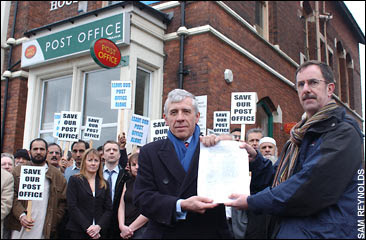Essex County Council's £1.5m plan to make its Council Tax payers prop up 15 local post offices is merely the latest twist in a long and dismal saga of public sector buck-passing.
The Essex post offices are among 2,500 unprofitable branches (from over 14,000) earmarked for the chop to stem £200m pa losses.
Thoughout the land there's been a predictable outcry. And throughout the land there's been a predictable rush by our grandstanding politicos to distance themselves from closure decisions and join photo-op protests. So what, if those self-same politicos were themselves party to decisions that led to the closures in the first place (pass the sick bag Straw, Jowell, Smith, etc etc)?
Who's responsible for this mess?
Specific closure decisions are taken by Post Offices Ltd, a state owned company. But in truth, they have little choice, having been ordered to cut losses by their departmental sponsor the Department for Business, Enterprise & Regulatory Reform (never heard of it? it's just the latest name for the same hopeless old DTI). And BERR had little choice, acting on the direct orders of HM Treasury (prop. G Brown esq).
But why were the POs making £200m of losses in the first place? Largely because the government has salami sliced away from them vast swathes of their traditional business, like for example on pensions and allowances.
Someone who's naturally taken a very close interest in this whole nasty business is the Village Postmaster. His sub-Post Office is thriving and has survived the axe, but he knows plenty about those that haven't. In this post (a letter to his local paper) he explains the backgound, and the prospect of a much larger shrinkage to come:
"The reason for the change was the ‘unsustainable and growing losses’ that Post Office Ltd was making, and the reason for the losses was the loss of Government work like Pensions and Allowances. It was Government who decided to ‘modernise’ the payment method, not the Post Office.
We now face a much more serious threat to the remaining branch network, and that is the end of the Post Office Card Account contract in 2010. Its replacement is currently out to tender and if Post Office Ltd fails to win the ongoing business, the consequence is likely to be the end of the Post Office network on a large scale, with it shrinking to the 3000 or 4000 commercial profitable branches" (against 14,000 branches now).
Now, it's we taxpayers who have been carrying the £200m pa loss, but that's not all we've been carrying. In addition, the government has been putting £150m pa into subsidising rural Post Offices because it thinks they are socially worthwhile. Add them together, and the Village Postmaster reckons that on average each rural PO is currently getting about £30,000 pa in taxpayer support. So some must be getting considerably more than that.
Do we think that's value for taxpayers' money? £350m pa is a lot of money: surely there must be cheaper ways of delivering cash and stamps to isolated old folk in outlying areas.
And as the VP points out, this whole problem could soon be a lot worse. If the PO card account contract is terminated in 2010 (nicely the other side of the next election), many more offices will become unviable. Economic logic says thousands more should close, but our spineless politicos are unlikely to allow that. So the subsidy will balloon still further- £0.5bn or even £1bn pa would be well on the cards.
And what of the Essex plan? They are proposing to spend £1.5m over three years propping up 15-16 offices. So that's about £30 grand pa each, roughly in line with the current subsidy. But will they be able to do any better than the existing managers?
True, if local Council Tax payers want to spend their money on supporting local services, that should be up to them. But in this case local taxpayers have not been consulted, and as the TPA was pointing out over the weekend, local authorities are hardly known for their entrpreneurial skills.
